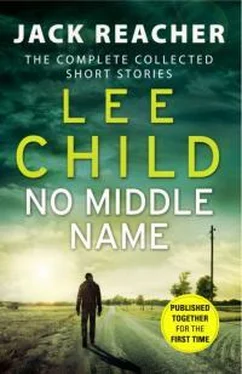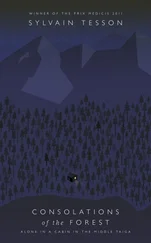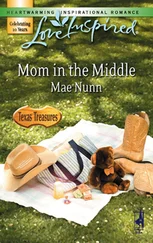It wasn’t. But the second car was. Which was more of a minivan, really. But not the kind of thing a soccer mom would be proud of. It was old and grimy, and somewhat battered. Light blue, maybe, when it left the factory, but now colourless, almost, faded by sun and salt. There was a young man at the wheel, and a young woman beside him in the front, and another young woman in the back. The van had New Brunswick plates, and it was trailing a puff of oil smoke, after pulling away from the customs post.
But Reacher had ridden in worse vehicles.
It slowed and stopped alongside him. The passenger window was already down. The woman in the front said, ‘We’re headed for Naismith.’
Which was a place Reacher had never heard of. He said, ‘I’m not sure where that is.’
The guy at the wheel leaned across and said, ‘The Allagash, man. About an hour west of Route 11. After going north for a bit. It’s a little town. Where you get on the wilderness trail through the forest. It’s a really cool place.’
Reacher said, ‘North of here?’
The guy said, ‘Beautiful country, man. You should see those woods. Really primeval. Step off the path, and you could be the first human ever to set foot. I mean, literally. Ten thousand years of undisturbed nature. Since the last Ice Age.’
Reacher said nothing.
The guy said, ‘Get it while you can, my friend. It won’t be there for ever. Climate change is going to take it all down.’
No particular place to be.
Reacher said, ‘OK, sure, thanks.’
One thing leads to another.
He looped around the rear of the van and the girl in the back slid the door on a rusty track and he climbed in. Behind him in the load space were two big backpacks and one hard-shell suitcase. The seat was some kind of nylon cloth gone greasy with age. He got settled and slid the door closed and the van moved off, puffing smoke again, from the effort.
‘Thanks,’ Reacher said, for the second time.
The trio introduced themselves. The girl in the back was Helen, and the girl in the front was Suzanne, and the driver was Henry. Henry and Suzanne were a couple. They ran a bicycle store in a place called Moncton. Helen was their friend. The plan was Henry and Suzanne would walk the wilderness trail north from Naismith, to a place called Cripps, which would take four days. Helen would be waiting there with the van to meet them, having spent the same four days doing something else, maybe antiquing in Presque Isle and Caribou.
‘I don’t like the woods,’ she said, as if she felt an explanation was required.
‘Why not?’ Reacher asked, because he felt a response was expected.
‘Too creepy,’ she said. ‘Too dark. Too full of bugs.’
They puttered onward past Houlton, and then Henry turned off on 212, which soon joined Route 11 going north, which was a pretty road. Saddleback Mountain was ahead on the right, and on the left was an endless expanse of woods and lakes. The trees were green, and the water glittered, and the sky was blue. Beautiful country, just like Henry had promised.
‘I don’t like the woods,’ Helen said again.
She was in her late twenties, Reacher guessed. Maybe thirty, tops. She was paler than her friends, and sleeker, and more cared for. Indoor, more than outdoor. Urban, rather than rural. Like her luggage. She was a hard-shell suitcase, not a backpack. Henry and Suzanne were stockier, and tousled, and wind-burned. But no older. Maybe they had all been college friends together, still a threesome more than five but less than ten years after graduation.
Henry said, ‘The woods are actually awesome, Helen.’
He said it kindly, full of enthusiasm. No hint of confrontation or scolding. Just a guy who loved the woods, unable to understand why his friend didn’t. He seemed genuinely intrigued by the possibility that he could walk where no other human had ever trod, in all of history. Reacher asked where they were all from originally, and it turned out that Henry and Suzanne were from the suburbs, of Toronto and Vancouver respectively, and it was Helen who was the real country girl, from what she called the trackless wastes of northern Ontario province. In which case he figured she was entitled to her opinion. She had earned it, presumably.
Then they asked where he was from, and his bio filled the next few miles. The Marine family, always moving, the dozen elementary schools, the dozen high schools, then West Point, then the U.S. Army, the military police, always moving all over again, some of the same countries, some new, never in one place long enough to notice. Then the drawdown, and the discharge, and the wandering. The hitched rides, the walking, the motels. The aimlessness. No particular place to be. Henry thought it was all very cool, Suzanne less so, Reacher thought, and he figured Helen didn’t think it was cool at all.
They slowed and turned left on to a narrow rural two-lane that speared straight west through the trees. There was a rusted enamel sign that said Naismith 40 miles . It was possible the road had once had shoulders, but they were long overgrown with underbrush and broadleaf trees that reached forty feet tall. In places their branches met overhead, so that for hundreds of yards at a time it was like driving through a green tunnel. Reacher watched out the windows, left and right. Either side he could see not more than five or six feet into the vegetation. He wondered how much more primeval woods could get. Brambles and brush were tangled thigh high, and the air looked dank and still. The ground looked soft and springy, densely matted with leaf litter, damp and fecund. The blacktop ribbon ahead had turned grey with age, and the heat it was holding made the air above it thick with tiny insects. After five miles the windshield was soupy with slime, from a million separate impacts.
Reacher asked, ‘Have you been here before?’
‘Once,’ Henry said. ‘We walked south to Center Mountain. Which was boring, man. I like to stay below the tree line. I guess I’m a forest dweller.’
‘Are there animals in there?’
‘Bears for sure. Plenty of small stuff, obviously. But the underbrush never gets eaten, so there’s no deer. Which is interesting as to why. Predation, most likely. But by what? Mountain lions, maybe. Or wolves, but no one ever sees them or hears them. But there’s something in there, that’s for sure.’
‘You sleep in a tent?’
‘Pup tent,’ he said. ‘No biggie. Double-bag your food, wash around your mouth in a stream, and there’s nothing for the critters to smell. Bears like to eat, but if you don’t lay out a picnic for them they’ll leave you alone. But you know all this, right? I mean, doesn’t the army train everywhere? I thought you got sent out in every kind of terrain.’
‘Not in a forest like this,’ Reacher said. ‘Can’t move through it, certainly can’t move vehicles through it, can’t shoot through it. Clearing it with napalm and explosives would take for ever. So we’d have to manoeuvre around it. Best kind of natural barrier there is.’
They drove on, over a surface that got progressively worse. The encroaching brush had nibbled out fist-sized bites of blacktop on both sides, and then tree roots had punched out deeper holes, and the winter freezes had elongated the cracks, and the state’s fixes had been infrequent and hasty. The old van’s suspension creaked and pattered. Overhead the green tunnels became more or less continuous. In places leafy vines hung down and whipped the roof.
Then exactly an hour after leaving Route 11 there was a cleared length of shoulder with a board sign on it, which had words burned into it with a hot poker: Welcome to Naismith, the Gateway to the Wilderness . Which Reacher felt was about an hour too late. He felt that particular threshold had been passed long ago.
Читать дальше











